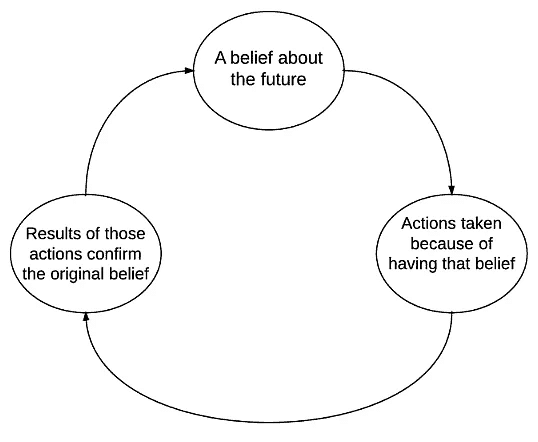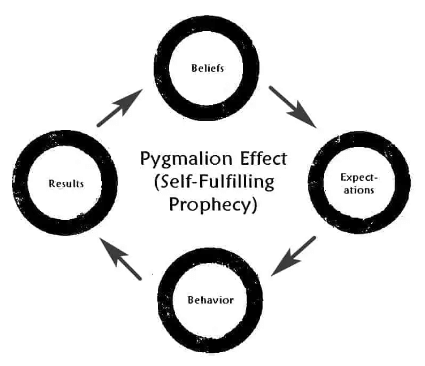Self-Fulfilling Prophecy and The Pygmalion Effect | Psychology for UPSC Optional (Notes) PDF Download
Introduction
The phenomenon of self-fulfilling prophecy holds a captivating power over our lives, shaping outcomes based on the expectations we hold. Whether it's the placebo effect in medicine or the influence of teachers' expectations on students' performance, self-fulfilling prophecies have a profound impact on our behavior and outcomes. In this article, we delve into the intricacies of self-fulfilling prophecies, exploring their definitions, examples, types, and the fascinating Pygmalion Effect.
Unraveling Self-Fulfilling Prophecies
Definition: The Power of Predictions
At its core, a self-fulfilling prophecy refers to a prediction that influences events, causing the prediction to come true. When our expectations about someone shape their behavior, we witness the fulfillment of these expectations. One prominent example is the placebo effect, where individuals experience positive outcomes simply because they believe in the effectiveness of an inactive treatment.

Classroom Dynamics: Impact on Students
In educational settings, self-fulfilling prophecies occur when teachers' expectations for students influence their behavior, leading them to conform to these expectations. Unfortunately, this can result in lower expectations for marginalized students and higher expectations for those from privileged backgrounds. Such biases can hinder or enhance students' academic performance.
Understanding the Two Types of Self-Fulfilling Prophecies
Self-Imposed Prophecies: The Power Within
Self-imposed prophecies arise when our own expectations shape our actions. For instance, a person who believes they will fail at public speaking may stumble over their words, ultimately fulfilling their prediction. Our internal beliefs significantly impact our behavior and shape the outcomes we experience.
Other-Imposed Prophecies: The Influence of Expectations
Other-imposed prophecies manifest when external expectations imposed by others influence an individual's actions. A classic example is the role of fortune tellers, whose predictions shape the beliefs of individuals and influence their choices. In this way, the expectations of others can significantly impact our behavior and shape our future.
The Pygmalion Effect: The Power of Expectations
The Pygmalion Effect, a type of other-imposed self-fulfilling prophecy, underscores how the way we treat someone can directly impact how they act. Drawing inspiration from the Greek myth of Pygmalion, researchers Rosenthal and Jacobsen explored how teachers' expectations influenced students' academic achievement.
- Rosenthal and Jacobsen's Study: In a groundbreaking experiment, Rosenthal and Jacobsen (1968) examined the impact of teacher expectations on student performance. By informing teachers which students were expected to be "Bloomers" (those with exceptional intellectual potential), they unintentionally created a self-fulfilling prophecy. The teachers provided more attention, time, and feedback to the Bloomers, leading to a significant increase in their IQ scores compared to average students.
- Replication and Implications: The Pygmalion Effect has been replicated in various contexts, such as college classrooms and workplace environments. It highlights the powerful impact of others' expectations on individuals' self-concept and subsequent behavior. Furthermore, stereotypes and discrimination often stem from other-imposed self-fulfilling prophecies, reinforcing societal biases and limiting individuals' potential.

The Causal Loop: Feedback Loops in Self-Fulfilling Prophecies
Self-fulfilling prophecies operate within causal loops or feedback cycles, where various aspects of a system influence each other. These loops perpetuate the prophecy, making it difficult to break free from the cycle of predicted outcomes.
A Cascading Effect: Merton's causal loop concept illustrates how a self-fulfilling prophecy gains momentum. For instance, a rumor about bank collapses leads people to withdraw their money, consequently causing the banks to struggle. As more people withdraw funds, the prophecy becomes a reality, ultimately resulting in the collapse of the banks.
Implications and Beyond
- The Power of Stereotypes: Stereotypes often perpetuate self-fulfilling prophecies. Steele's research on stereotype threat reveals that individuals may perform poorly when they fear confirming negative stereotypes associated with their social group. This phenomenon has implications for academic performance, career choices, and social interactions.
- Parental Influence and Workplace Dynamics: The Pygmalion Effect extends beyond the classroom, with parents playing a significant role in shaping their children's beliefs and potential. By treating children as intelligent and capable individuals, parents can foster positive self-concepts that lead to greater achievements. Similarly, managers in the workplace who raise their expectations for employees often witness improved performance.
Conclusion
Self-fulfilling prophecies, with their undeniable impact on our lives, remind us of the power of expectations. Whether through self-imposed or other-imposed prophecies, our beliefs shape our actions and mold our reality. Understanding the Pygmalion Effect and the causal loops within self-fulfilling prophecies allows us to navigate these dynamics consciously, leveraging their potential for positive outcomes and challenging the limitations they impose.|
165 videos|205 docs
|

|
Explore Courses for UPSC exam
|

|

















